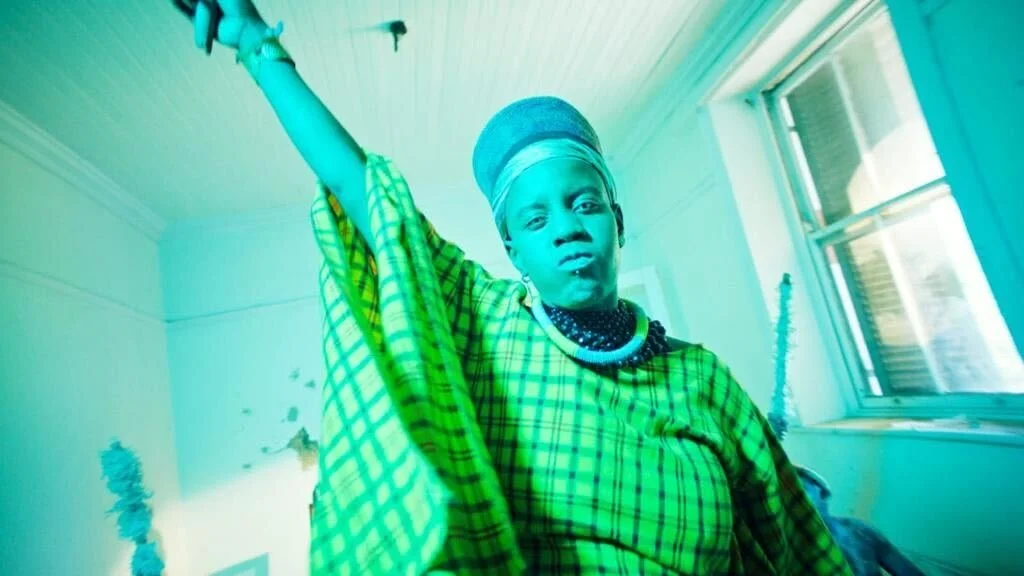Toya Delazy- Black to the Future
Words by Gabriela Vallim and Sechaba Nkitseng
Gabriela Vallim speaks to Toya Delazy Afrofuturism and its power to connect the black diaspora with their forgotten African ancestry through music
One of the most prominent South African singers, Delazy, is embracing a cultural movement that explores the intersection of African culture, technology, and remembering history. Bringing the African diaspora together, Afrofuturism is blending the past with the present and future to build a better tomorrow.
“When you come from a place of being erased while living. The memory of what our (black South African) parents have gone through during that period (Apartheid) changes your perspective (mind). It changes how you interact. That’s why we now connect through our music, and part of the reason why the world connects to us (South Africa) is that we are the birthplace of humanity, and the cradle of mankind is in South Africa. Eventually, humans spread out into the rest of the world. That is why you see a part of yourself in us (South Africans)—the culture of acknowledging the other (greeting), the connection touch, and that genuineness”.
Toya Delazy, whose real name is Latoya Nontokozo Buthelezi is known for her unique blend of Zulu rap, bass, dubstep electro-pop, jazz, and other traditional African rhythms. Her music has taken her from her hometown in KwaZulu-Natal to stages worldwide, and she has become a cultural ambassador for South Africa. Through her music and activism, Toya Delazy is helping to raise awareness of the unique cultural traditions of South Africa's indigenous communities and to promote greater understanding and respect for their rights and heritage.
“As a young girl, I knew of my great-grandmother Princess Constance Magogo, who had broken gender roles as the first indigenous artist in Africa to be recorded”.
Delazy has been vocal about her indigenous heritage and has used her music to celebrate and promote the cultural traditions of South Africa's indigenous peoples. Her music often incorporates elements of traditional African rhythms and features lyrics in English and Zulu, which is one of the most widely spoken indigenous languages in South Africa.
“Coming from South Africa, I was greeting people in London on the trains. You know, holding so much of my culture. Eventually, the city prunes you, and we lose that common touch, that genuine connection in being open. We've become very programmed to be this way because it's a way of success”.
Creator of the AfroRave, a sub-genre of electronic dance music that draws heavily on African rhythms, instruments, and vocals: Toya is undoubtedly at the forefront of combining potent messages, making it the perfect soundtrack for a night of dancing and celebration.
“We don't need to be out here carrying flags and being banished for all these things. But eventually, it becomes political because you cannot be anything without fully acknowledging your vehicle. Your body is a vehicle. We are fluid. Our societies have been fluid and matriarchal. But everything's been changed to fit into the systems that we live in today”.
Gab-
From our first interview for the Rave Report Radio Show at Reprezent Radio, I reflected on how black people in Brazil go through similar struggles. Although we didn’t have one official apartheid, racism is at the core; white supremacy is as much of a problem in the country, which is not reflective of how the world shows Brazil - as a unified nation (South Africa also has the same perception from the world as the ‘rainbow nation’). That’s why knowing our past is essential not to replicate previous mistakes. I love how you share the message of building communities and allowing ourselves not to fit in to be genuinely who we decide to be.
As a black girl from Brazil, walking in London every day with my natural hair out is not easy, but it is my statement to the world- We don't need permission to be who we are. I see you as a symbol of identity, strength and representation. Your music, your fashion, your hair, your family. Your existence is political and inspires me.
Toya- First, I identify with everything you say about the similarities between us black people. We don't realise we are all going through the same thing until we speak like this.
Gab- What inspires you?
Toya- I came from a very conservative family - governed by religion, politics, and royalty. These institutions are compelling and are surrounded by sexism and patriarchy. I'm fortunate to know my family tree. My family has been part of a massive movement of black liberation, fighting the British Empire in 1879 during the Battle of Isandlwana and winning when they didn't expect it, destabilising the colonisation that aimed to make us forget who we are.
Our Deepest Fear by Marianne Williamson is one of the poems that started waking me up as a young girl:
"Our deepest fear is not that we are inadequate. Our deepest fear is that we are powerful beyond measure. It is our Light, not our Darkness that most frightens us. We ask ourselves, who am I to be brilliant, gorgeous, talented, fabulous? Actually, who are you not to be?”
Going through school I was educated about how Europe erased our history. So many things have been taken from black communities, from indigenous people. Black people have been fundamental to the building of this world.
Gab- What makes you want to be you unapologetically?
Toya- All these rules governed my society. As a princess and religious person, you must behave a certain way. Being part of a family from politics comes with its pressures. And I had all these things that were already shaping part of who I wanted to be. And then there's me—the little girl who sees herself entirely differently. I mean, now I've grown up, I am queer. I've got a family. That’s all. I'm not acting like a little princess or whatever.
We've been conditioned to believe that the less of who you are, the more successful you'll be. So, I fought this in South Africa until I decided to go independent from my record label because I was also discovering whether it comes to sexuality.
Gab- Why is it important to talk about the story behind an artist?
Toya- We wouldn’t have music if we did not go through experiences. This is what happens with erasure. We forget who we are when we are silenced and cannot express ourselves. Once you express yourself, you feel good. You feel understood. Expression is part of growth. It is essential to embrace individuality and individual cultures because they cannot be replicated. Even our languages need to be preserved as well because people (our ancestors) died for us to be able to see ourselves. Acknowledge them is to acknowledge ourselves. Even with our prayers, we must connect ourselves to our ancestors.
Gab- Language can be a potent tool. You have been exploring this resource very well to reach different crowds and position yourself in a global market. Why sing in English back home and in your traditional language in the UK? Was it intentional?
Toya- Using English allowed me to connect and share my story with a global audience and compete at the same level, It was great then, mainly because popsters like the Taylor Swifts were not common in my context, and also showed people back home that we are open in expression.
You can only express yourself as healed when you've set yourself free. Africa is where everything starts - from our drums. You'll find that sound is at the heart of it because of its vibrations and how it can address things for which we sometimes just don't have the language to express. Being able to bring that into rave communicates. I don't know. You can't even explain this in a Caucasian way.
When I arrived in the (UK), which is an English-speaking country, I recognised how important it was to preserve and be proud of my culture using my language, which allows for disrupting narratives as well as genuinely showing my culture to the rest of the world, which is an integral part of who I am.
Gab- I see masks and other elements of your traditional culture. How does it impact your work?
Toya- It's an expression. Clothing is a crucial part of the Zulu culture, it describes status in the community, and all these connections between the aesthetics of culture and electro and rave are embodied in how it looks. The idea of looking into how our cultures can look towards the future is Afrofuturist, the past, the present and the future all combined into one. It's all about representation.
Gab- Tell us about “Find di Boy”.
Toya- I never thought I would write this song. I tried finding the boy, but it never worked. It was never for me; it felt right when I kissed a girl for the first time. The song is about breaking those heterosexual constructs and expectations.
“I am pansexual. For me, it's all about love. It is what attracts me. I believe in letting go of the conditioning and being alive and free. Being yourself is what being human is about. It is essential to show that, to find happiness and to reflect inwards, not outwards. Allowing that inner child to flourish to be free”.
Gab- In your interview for the Afternoon Express, you emphasise how the pap smear helped you to treat precancerous cells from the early stage. What is the connection between rave and health care?
Toya- The only reason I rave is for mental health. It is healing for me. This is why I started from day one. Afrorave is for connecting the dots. Celebrate your body, love your body and check on it.
Gab- What message are you trying to convey with “Tini”?
Toya- We are allowed to exist with our languages and cultures. It’s all okay. There are no bounds to what this is.
On Saturday 15th April, Toya Delazy headlines the first Baile LDN of 2023 with Love In The Endz, Emily Dust & Mango Park. Expect to hear afro rave, GQOM, UK funky, bass music, and baile funk in Dalston. Buy your tickets here.



